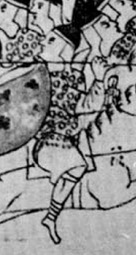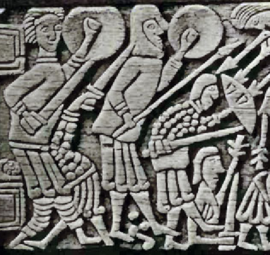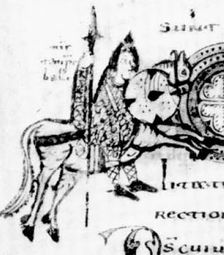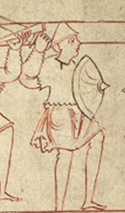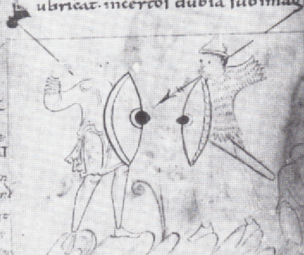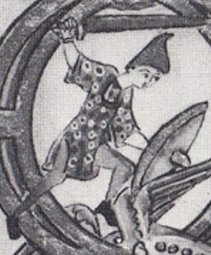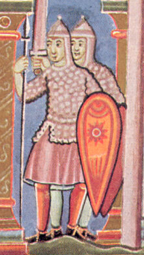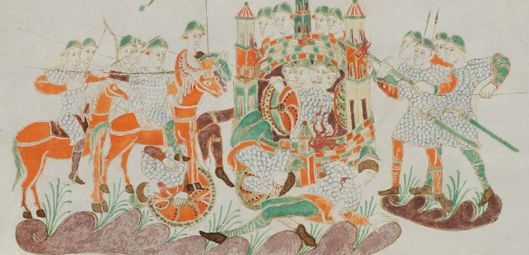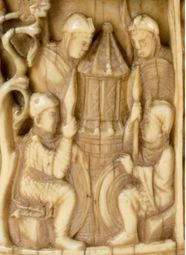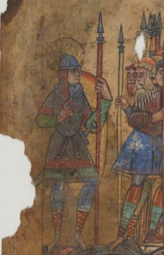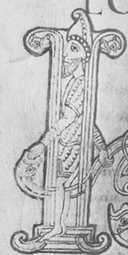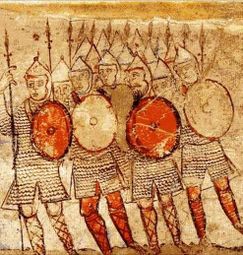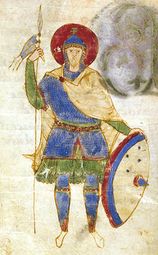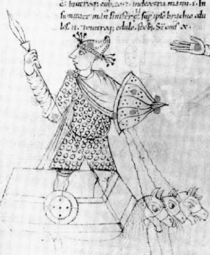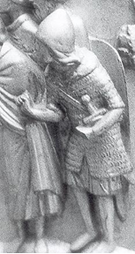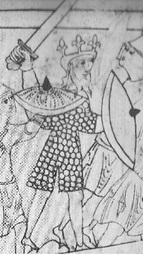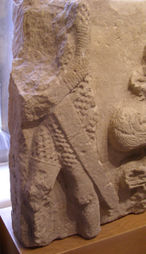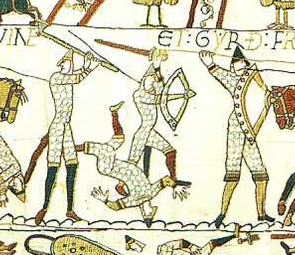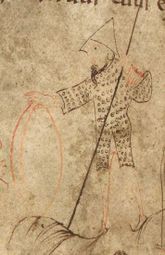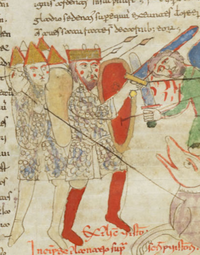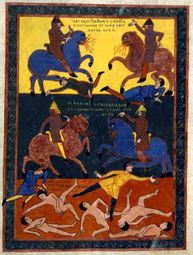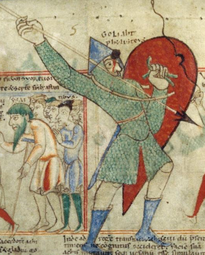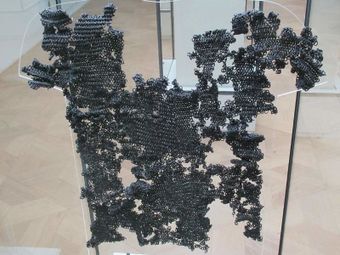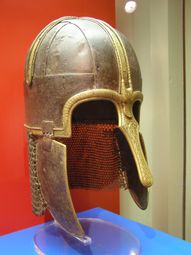Difference between revisions of "Mail Shirts"
m |
m (→Beowulf) |
||
| (55 intermediate revisions by the same user not shown) | |||
| Line 1: | Line 1: | ||
| − | + | {{stars1|Category = Armour}} | |
| − | {| | + | {{TOClimit|3}} |
| − | + | {{Armour}} | |
| − | + | <br> | |
| − | + | ||
| − | + | ||
| − | + | ||
| − | + | ||
| − | + | ||
| − | + | ==Introduction== | |
| − | ==Short mail | + | We have no surviving mail shirts from the Viking Age in Britain. Even across Europe we only have the one find from Gjermundbu in Norway and that is seriously damaged due to being cremated. |
| + | So to deduce the style of mail shirts worn during the Viking Age in Britain we need to look at both the manuscript evidence, both Anglo-Saxon and continental, and at the scraps of mail that we have managed to recover. | ||
| + | Unfortunately although armour is mentioned in literature, for example Beowulf, it is usually refereed to simply as a byrnie. This translates as "body Armour" and doesn't necessarily mean that it's a mail shirt as it could equally be referring to scale armour or even lamella. | ||
| + | This issue of separating Mail shirts from other forms of body armour is equally an issue with manuscript images. Here I have made a 'best guess' but I appreciate that other people may well interpret an image differently to myself. | ||
| + | |||
| + | ==Type 1 : Short Mail Shirts== | ||
| + | |||
| + | |||
| + | ===Type 1a: Short mail shirt to just below the waist with short sleeves=== | ||
''A mail shirt that stops a couple of inches below the belt. Sleeves are usually to the elbow but can extend to the wrist.'' | ''A mail shirt that stops a couple of inches below the belt. Sleeves are usually to the elbow but can extend to the wrist.'' | ||
| − | |||
| − | |||
| − | |||
| − | |||
| − | |||
| − | |||
| − | |||
| − | |||
| − | |||
| − | |||
| − | |||
| − | ''' | + | '''Anglo-Saxon'''<br> |
| − | + | <gallery heights=170px mode="Packed" style="text-align: left;"> | |
| − | + | </gallery> | |
| − | ''' | + | |
| + | '''Carolingian'''<br> | ||
| + | <gallery heights=170px mode="Packed" style="text-align: left;"> | ||
| + | Book of Maccabees1.png|''Book of Maccabees c.????'' | ||
| + | </gallery> | ||
| + | |||
It would appear that the typical 8th - 9th century mail shirt seems to end just below the belt line. Some of them appear as though they may be vandyked or side split – see below.<br> | It would appear that the typical 8th - 9th century mail shirt seems to end just below the belt line. Some of them appear as though they may be vandyked or side split – see below.<br> | ||
| − | |||
| − | + | ||
| − | == | + | ===Type 1b: Short mail shirt to just below the waist with long sleeves=== |
| − | + | '''Anglo-Saxon'''<br> | |
| − | < | + | <gallery heights=170px mode="Packed" style="text-align: left;"> |
| − | + | Franks Casket.png|Franks Casket c.700-750 | |
| − | |- | + | </gallery> |
| − | + | ||
| − | | | + | '''Carolingian'''<br> |
| − | + | <gallery heights=170px mode="Packed" style="text-align: left;"> | |
| − | + | BNF_Lat._12048_Gellone_Sacramentary.JPG|BNF Lat. 12048 Gellone Sacramentary, c.790-795 | |
| − | + | </gallery> | |
| − | + | ||
| − | + | ===Type 1c: Short Vandyked mail shirt to just below the waist with short sleeves=== | |
| − | | | + | ''Vandykes are a triangular finish to the hem and sometimes the cuff of a mail shirt.'' |
| − | '' | + | |
| − | + | '''Anglo-Saxon'''<br> | |
| − | ''' | + | <gallery heights=170px mode="Packed" style="text-align: left;"> |
| − | + | T49 f.18v 1.png|''BL Cotton Cleopatra C VIII f.18v, c.1000'' | |
| − | ''' | + | BL Cotton Cleopatra CVIII f.27v.png|''BL Cotton Cleopatra C VIII, f.27v, c.1000'' |
| − | - | + | </gallery> |
| − | + | ||
| + | '''Carolingian'''<br> | ||
| + | <gallery heights=170px mode="Packed" style="text-align: left;"> | ||
| + | </gallery> | ||
| + | |||
We have a few pictures that can be interpreted as Vandyked shirts. London, BL, Cotton Cleopatra C VIII f.18v dated to the late C10th is perhaps the most famous although it may not actually be a mail shirt. | We have a few pictures that can be interpreted as Vandyked shirts. London, BL, Cotton Cleopatra C VIII f.18v dated to the late C10th is perhaps the most famous although it may not actually be a mail shirt. | ||
[Migration era evidence?] | [Migration era evidence?] | ||
| − | + | ===Type 1d: Side split mail shirt=== | |
| − | + | ||
| − | + | ||
| − | + | ||
| − | = | + | |
''A side split mail shirt’s skirt is open at the sides. An unsplit mail shirt has an additional side gore added to the side of the skirt to allow movement and offer protection.'' | ''A side split mail shirt’s skirt is open at the sides. An unsplit mail shirt has an additional side gore added to the side of the skirt to allow movement and offer protection.'' | ||
| − | |||
| − | |||
| − | |||
| − | |||
| − | |||
| − | |||
| − | |||
| − | |||
| − | |||
| − | |||
| − | |||
| − | |||
| − | |||
| − | |||
| − | |||
| − | + | '''Anglo-Saxon'''<br> | |
| − | + | <gallery heights=170px mode="Packed" style="text-align: left;"> | |
| − | == | + | Mail Shirt (Douce 296 f.40v).png|[[:Category:Oxford, Bodleian Library, MS Douce 296|Bod. Lib., MS Douce 296]] c.1025-1050 |
| + | </gallery> | ||
| + | |||
| + | '''Carolingian'''<br> | ||
| + | <gallery heights=170px mode="Packed" style="text-align: left;"> | ||
| + | Codex Aureus Epternacensis f.18v 1.png|''Nurnberg, Nat. Germ. Mus., f.18v, Codex Aureus, c.1020'' | ||
| + | </gallery> | ||
| + | |||
| + | Mail shirts are usually shown unsplit. A few of the depictions from Western European manuscripts do however show side split mail shirts. | ||
| + | |||
| + | ==Type 2: Standard Mail Shirts== | ||
| + | |||
| + | |||
| + | ===Type 2a: Mail shirt to mid-thigh or knee with short sleeves=== | ||
''A mail shirt that reaches to the thigh, with sleeves that usually come to the elbow.'' | ''A mail shirt that reaches to the thigh, with sleeves that usually come to the elbow.'' | ||
| − | |||
| − | |||
| − | |||
| − | |||
| − | |||
| − | |||
| − | |||
| − | |||
| − | |||
| − | |||
| − | |||
| − | |||
| − | |||
| − | |||
| − | |||
| − | |||
| − | |||
| − | <br> | + | '''Anglo-Saxon'''<br> |
| + | <gallery heights=170px mode="Packed" style="text-align: left;"> | ||
| + | </gallery> | ||
| − | <br> | + | '''Carolingian / Ottonian'''<br> |
| − | + | <gallery heights=170px mode="Packed" style="text-align: left;"> | |
| − | == | + | St. Gallen, Stiftsbibliothek 141.JPG|''[[:Category:St. Gallen, Stiftsbibliothek, Cod. Sang. 22|St. Gallen, Golden Psalter]], c.833'' |
| + | The Basilewsky Situla (V&A A.18-1933) - Detail 1.jpg|''The Basilewsky Situla (V&A A.18-1933), c.980-81, Milan'' | ||
| + | Aachen Ivory Situla Warriors.jpg|''[[:Category:Aachen Cathedral Treasury|Aachen Ivory Situla ]] c.1000'' | ||
| + | La Vie De Saint Aubin 1.png|''[[:Category:Paris, Bibliotheque Nationale, NAL 1390|Paris, Bib. Nat., NAL 1390, La Vie De Saint Aubin]] c.1100'' | ||
| + | </gallery> | ||
| − | + | ===Type 2b: Mail shirt to mid-thigh or knee with a small split and short sleeves=== | |
| − | + | ''A mail shirt that reaches to the thigh, has a small split front and back, and sleeves that usually come to the elbow.'' | |
| − | '' | + | |
| − | + | ||
| − | + | ||
| − | + | ||
| − | + | ||
| − | + | ||
| − | + | '''Anglo-Saxon'''<br> | |
| − | + | <gallery heights=170px mode="Packed" style="text-align: left;"> | |
| − | === | + | Mail Shirt (Boulogne MS11 f.104v).png|[[:Category:Boulogne, Bibliotheque Municipale, MS11|Boulogne MS11 f.104v]], c.980-1041 |
| − | + | </gallery> | |
| + | |||
| + | '''Carolingian / Ottonian'''<br> | ||
| + | <gallery heights=170px mode="Packed" style="text-align: left;"> | ||
| + | Shields_Vatican,_MS_Lat._9820.jpg|Vatican Lat. 9820, c.985-987 | ||
| + | British Lib. Egerton 3763 f. 116v.JPG|BL Egerton 3763, f.116v, c.998-1018 | ||
| + | DiJon, Bib. Mun. MS 488 f.68v.png|Dijon, Bib. Mun. MS 488 f.68v, Constellation, c.1000 | ||
| + | Hildesheimer Cathedral.png|Hildesheim Cathedral, c. ???? | ||
| + | </gallery> | ||
| − | |||
| − | |||
| − | |||
* 980AD Byzantine [NICOLLE 2005: p.51] | * 980AD Byzantine [NICOLLE 2005: p.51] | ||
| − | + | <br><br> | |
| − | + | ===Type 2c: Mail shirt to mid-thigh or knee, short sleeves & chausses=== | |
| − | ===Bayeux | + | ''A mail shirt that reaches to the thigh, sleeves that usually come to the elbow and mail covered legs (chausses)'' |
| + | |||
| + | '''Carolingian / Ottonian'''<br> | ||
| + | <gallery heights=170px mode="Packed" style="text-align: left;"> | ||
| + | Vercelli-MS CLXV-9C-detail 1.jpg|''Vercelli Bib., MS CLXV, c.825'' | ||
| + | </gallery> | ||
| + | |||
| + | ==Type 3: Long Mail Shirts== | ||
| + | |||
| + | |||
| + | ===Type 3a: Long mail shirt with a 'Bayeux style' split, an integral coif and short sleeves=== | ||
''Interpreted as either a front split mail shirt or alternatively a mail shirt with mail shorts.'' | ''Interpreted as either a front split mail shirt or alternatively a mail shirt with mail shorts.'' | ||
| − | |||
| − | |||
| − | |||
| − | |||
| − | |||
| − | |||
| − | + | '''Anglo-Saxon'''<br> | |
| − | === | + | <gallery heights=170px mode="Packed" style="text-align: left;"> |
| + | T86 Hexateuch1.png|Hexateuch c.1025-1050 | ||
| + | Winchester Carving.jpg|Winchester Carving c.1050-1100 | ||
| + | Bayeux Tapestry. Harolds Brothers.png|[[:Category:Bayeux Tapestry|Bayeux Tapestry]] c.1076 | ||
| + | </gallery> | ||
| + | |||
| + | '''Ottonian / Norman'''<br> | ||
| + | <gallery heights=170px mode="Packed" style="text-align: left;"> | ||
| + | |||
| + | </gallery> | ||
| + | |||
| + | |||
| + | |||
| + | The ‘mail shorts’ theory has been dismissed by Wilson [WILSON 1985] and Grape [GRAPE 1994]. They consider these images to simple show a stylised form of a long split (Type 3b).<br> | ||
| + | |||
| + | ===Type 3b: Long mail shirt with a long style split, an integral coif, and short sleeves=== | ||
| + | |||
| + | '''Anglo-Saxon'''<br> | ||
| + | <gallery heights=170px mode="Packed" style="text-align: left;"> | ||
| + | Mail Shirt (Harley Psalter f.73v).jpg|Harley Psalter f.73, c.1025-1050 | ||
| + | </gallery> | ||
| + | |||
| + | '''Ottonian / Norman'''<br> | ||
| + | <gallery heights=170px mode="Packed" style="text-align: left;"> | ||
| + | Mail Shirt (Genève, Bibliothèque de Genève, Ms. lat. 357 - Apocalypse -Beatus).png|Genève, Ms. lat. 357, C11th | ||
| + | |||
| + | </gallery> | ||
| + | |||
| + | ===Type 3c: Long mail shirt with a long style split, an integral coif, and long sleeves=== | ||
| + | |||
| + | |||
| + | '''Anglo-Saxon'''<br> | ||
| + | <gallery heights=170px mode="Packed" style="text-align: left;"> | ||
| + | |||
| + | </gallery> | ||
| + | |||
| + | '''Ottonian / Norman'''<br> | ||
| + | <gallery heights=170px mode="Packed" style="text-align: left;"> | ||
| + | BnF_Ms_Lat._8879_f.148v_Horsemen_of_the_Apocalypse.jpg|BnF Ms_Lat. 8879 f.148v, Horsemen of the Apocalypse, c.1050 | ||
| + | Dijon Bib. Mun. MS. 14 fol.13 Goliath.png|Dijon, Bib. Mun. MS. 14 f.13, Bible of St. Etienne, Goliath, c.1109-1111 | ||
| + | </gallery> | ||
| + | |||
| + | == Mail shirt Construction== | ||
| − | |||
| − | |||
| − | |||
| − | |||
| − | |||
| − | |||
| − | |||
===6 - 8mm alternating riveted & welded=== | ===6 - 8mm alternating riveted & welded=== | ||
| − | < | + | <gallery heights=170px mode="Packed" style="text-align: left;"> |
| − | + | NCH-Gjermundbu Mail Shirt.jpg|Gjermundbu, Norway, c.980 | |
| − | + | </gallery> | |
| − | + | ||
| − | + | ||
| − | + | ||
| − | + | ||
| − | + | ||
| − | + | ||
| − | + | ||
'''Archaeology'''<br> | '''Archaeology'''<br> | ||
| Line 163: | Line 177: | ||
*Sutton Hoo c.650AD (POLLINGTON 2006, p.152) - 8mm links, alternate riveted and butt-jointed, to mid thigh | *Sutton Hoo c.650AD (POLLINGTON 2006, p.152) - 8mm links, alternate riveted and butt-jointed, to mid thigh | ||
*Dublin (HALPIN 2008, p.179) | *Dublin (HALPIN 2008, p.179) | ||
| + | |||
'''Discussion'''<br> | '''Discussion'''<br> | ||
Most of the Viking Age finds seem to be in this size range.<br> | Most of the Viking Age finds seem to be in this size range.<br> | ||
<br> | <br> | ||
| + | |||
===6 - 8mm riveted=== | ===6 - 8mm riveted=== | ||
| − | |||
| − | |||
| − | |||
| − | |||
| − | |||
| − | |||
| − | |||
| − | |||
| − | |||
| − | |||
'''Archaeology'''<br> | '''Archaeology'''<br> | ||
| − | -- | + | --<br> |
'''Discussion'''<br> | '''Discussion'''<br> | ||
| − | + | We have no finds of 100% riveted shirts that have been dated between 800-1100.<br> | |
<br> | <br> | ||
| + | |||
===Riveted links over 8mm=== | ===Riveted links over 8mm=== | ||
| − | + | ||
| − | + | ||
| − | + | ||
| − | + | ||
| − | + | ||
| − | + | ||
| − | + | ||
| − | + | ||
| − | + | ||
| − | + | ||
'''Archaeology'''<br> | '''Archaeology'''<br> | ||
*Tuna, Gotland (TWEDDLE 1992) has an internal link diameter up to approx.10mm in size | *Tuna, Gotland (TWEDDLE 1992) has an internal link diameter up to approx.10mm in size | ||
*Russia (D’AMATO 2012, p.34) some links measuring up to 25mm | *Russia (D’AMATO 2012, p.34) some links measuring up to 25mm | ||
| + | |||
'''Discussion'''<br> | '''Discussion'''<br> | ||
It appears that Eastern mail shirts could have even larger rings with some from Russia measuring up to 25mm. (D’AMATO 2012, p.34)<br> | It appears that Eastern mail shirts could have even larger rings with some from Russia measuring up to 25mm. (D’AMATO 2012, p.34)<br> | ||
<br> | <br> | ||
| + | |||
=== Butted links === | === Butted links === | ||
| − | - | + | We have no finds of butted links that have been dated between 800-1100.<br> |
<br> | <br> | ||
| + | |||
| + | |||
==Copper alloy mail links used for decoration== | ==Copper alloy mail links used for decoration== | ||
''A double row of copper alloy links used to edge mail shirts and aventails.'' | ''A double row of copper alloy links used to edge mail shirts and aventails.'' | ||
| − | < | + | |
| − | + | <gallery heights=170px mode="Packed" style="text-align: left;"> | |
| − | | | + | YM Coppergate Hemet CA665.jpg|Coppergate Helmet, York, England, C8th |
| − | + | </gallery> | |
| − | + | ||
| − | + | ||
| − | + | ||
| − | + | ||
| − | + | ||
| − | + | ||
'''Archaeology'''<br> | '''Archaeology'''<br> | ||
*York, England, C8th (TWEDDLE 1992, p.1003) Coppergate helmet,4 links. | *York, England, C8th (TWEDDLE 1992, p.1003) Coppergate helmet,4 links. | ||
*Gotland, Sweden, C9th-12th (TWEDDLE 1992, p.1185) Graves 14.7 & 8. This had two rows of copper alloy links at a possible vertical edge. | *Gotland, Sweden, C9th-12th (TWEDDLE 1992, p.1185) Graves 14.7 & 8. This had two rows of copper alloy links at a possible vertical edge. | ||
| + | |||
'''Discussion'''<br> | '''Discussion'''<br> | ||
The Coppergate helmet possibly had either a double row of copper alloy links edging the aventail or alternatively they could have been talismans. Copper alloy talismans and edges are frequently found on medieval mail shirts (TWEDDLE 1992, p.1003).<br> | The Coppergate helmet possibly had either a double row of copper alloy links edging the aventail or alternatively they could have been talismans. Copper alloy talismans and edges are frequently found on medieval mail shirts (TWEDDLE 1992, p.1003).<br> | ||
<br> | <br> | ||
| − | ==Mail | + | |
| − | '' | + | ==Lined Mail shirts== |
| − | + | ''Mail shirts that are lined on the inside with cloth or leather and that have a cloth or leather edging.'' | |
| − | + | ||
| − | + | Bayeux Tapestry | |
| − | + | ||
| − | + | ==Literature== | |
| − | + | ||
| − | + | ===Anglo-Saxon Chronicle=== | |
| − | |- | + | A.D. 1008. <br> |
| − | + | "This year bade the king that men should speedily build ships over all England; that is, a man possessed of three hundred and ten hides to provide a galley or skiff; and a man possessed of eight hides only, to find a helmet and mail shirt." | |
| − | + | ||
| + | |||
| + | ===Beowulf=== | ||
| + | Written in c.1000 but from an older story.<br> | ||
| + | We've started working on a comparison between translations to determine what words may have possibly represented mail shirts.<br><br> | ||
| + | |||
| + | * Heorot http://www.heorot.dk/beowulf-rede-text.html | ||
| + | * Gutenburg http://www.gutenberg.org/files/16328/16328-h/16328-h.htm | ||
| + | * Orford {{listRef|Crossley-Holland 1982}} | ||
| + | * Old English Translator http://www.oldenglishtranslator.co.uk/ | ||
| + | |||
| + | Note: <br> | ||
| + | Corslet is defined by the Oxford English Dictionary as meaning "a piece of defensive armour covering the body."<br> | ||
| + | |||
| + | Byrnie<br> | ||
| + | Bennet, M., Bradbury, J., DeVries, K., Dickie, I., & Jestice, P. Fighting Techniques of the Medieval World. Thomas Dunne Books, 2005, p. 82<br> | ||
| + | ''"There is some dispute among historians as to what exactly constituted the Carolingian byrnie. Relying... only on artistic and some literary sources because of the lack of archaeological examples, some believe that it was a heavy leather jacket with metal scales sewn onto it. It was also quite long, reaching below the hips and covering most of the arms. Other historians claim instead that the Carolingian byrnie was nothing more than a coat of mail, but longer and perhaps heavier than traditional early medieval mail. Without more certain evidence, this dispute will continue."'' | ||
| − | |||
<br> | <br> | ||
| + | |||
| + | {| class="wikitable" | ||
| + | |- | ||
| + | ! Original Anglo-Saxon !! Heorot !! Gutenburg !! Oxford !! Old English Translator | ||
| + | |- | ||
| + | | (37) of feorwegum '''frætwa''' gelaéded | ||
| + | || from far-off lands ornate '''armour''' and baubles were brought; | ||
| + | || (I 37) The famed by the mainmast. A many of jewels, | ||
| + | || And adornments from far and wide were gathered there | ||
| + | || 'frætwa' = '''armour''' | ||
| + | |- | ||
| + | | (40) billum ond '''byrnum'''· him on bearme læg | ||
| + | || bill-blades and '''byrnies'''; there lay on his breast | ||
| + | || (I 42) Bills and '''burnies'''; on his bosom sparkled | ||
| + | || Swords and '''corslets'''; on his breast | ||
| + | || 'byrnum' = '''Corselet''' | ||
| + | |- | ||
| + | | (214) | ||
| + | || | ||
| + | || | ||
| + | || | ||
| + | || | ||
| + | |- | ||
| + | | saéwudu '''saéldon'''· syrcan hrysedon | ||
| + | || moored their vessel; their '''mail-shirts''' clanked | ||
| + | || (IV 37) Fastened their vessel (battle weeds rattled, '''War burnies''' clattered) | ||
| + | || Tying up the boat their '''corslets''' clanked | ||
| + | || 'saéldon' = '''coat of mail''' | ||
| + | |- | ||
| + | | (237) | ||
| + | || | ||
| + | || | ||
| + | || | ||
| + | || | ||
| + | |- | ||
| + | | (238) '''byrnum''' werede þe þus brontne céol | ||
| + | || bound in '''byrnies''', who thus your tall keel | ||
| + | || (IV 49) Clad in your '''corslets''', come thus a-driving A high riding ship | ||
| + | || In your '''coats of mail''' who have steered your tall ship | ||
| + | || 'byrnum' = '''Corselet''' | ||
| + | |- | ||
| + | | (322) heard hondlocen '''hringíren''' scí | ||
| + | || harsh, linked by hand, '''ring-iron''' glittering | ||
| + | || (VI 4) The ring-sword radiant rang ’mid the '''armor''' | ||
| + | || The strong links of shining '''chain-mail''' clinked together | ||
| + | || | ||
| + | |- | ||
| + | | (1211) '''bréostgewaédu''' ond se béah somod | ||
| + | || mail-coat and the ring together | ||
| + | || | ||
| + | || | ||
| + | || 'Bréost' = '''Breast, stomach, womb, mind, richness''', 'gewaédu' = ???? | ||
| + | |} | ||
| + | |||
==References== | ==References== | ||
{{Ref|Grape 1994}} | {{Ref|Grape 1994}} | ||
Latest revision as of 19:24, 14 June 2020
| Mail Shirts |
|---|
|
More Armour pages
Introduction
We have no surviving mail shirts from the Viking Age in Britain. Even across Europe we only have the one find from Gjermundbu in Norway and that is seriously damaged due to being cremated. So to deduce the style of mail shirts worn during the Viking Age in Britain we need to look at both the manuscript evidence, both Anglo-Saxon and continental, and at the scraps of mail that we have managed to recover. Unfortunately although armour is mentioned in literature, for example Beowulf, it is usually refereed to simply as a byrnie. This translates as "body Armour" and doesn't necessarily mean that it's a mail shirt as it could equally be referring to scale armour or even lamella. This issue of separating Mail shirts from other forms of body armour is equally an issue with manuscript images. Here I have made a 'best guess' but I appreciate that other people may well interpret an image differently to myself.
Type 1 : Short Mail Shirts
Type 1a: Short mail shirt to just below the waist with short sleeves
A mail shirt that stops a couple of inches below the belt. Sleeves are usually to the elbow but can extend to the wrist.
Anglo-Saxon
Carolingian
It would appear that the typical 8th - 9th century mail shirt seems to end just below the belt line. Some of them appear as though they may be vandyked or side split – see below.
Type 1b: Short mail shirt to just below the waist with long sleeves
Anglo-Saxon
Carolingian
Type 1c: Short Vandyked mail shirt to just below the waist with short sleeves
Vandykes are a triangular finish to the hem and sometimes the cuff of a mail shirt.
Anglo-Saxon
Carolingian
We have a few pictures that can be interpreted as Vandyked shirts. London, BL, Cotton Cleopatra C VIII f.18v dated to the late C10th is perhaps the most famous although it may not actually be a mail shirt. [Migration era evidence?]
Type 1d: Side split mail shirt
A side split mail shirt’s skirt is open at the sides. An unsplit mail shirt has an additional side gore added to the side of the skirt to allow movement and offer protection.
Anglo-Saxon
Bod. Lib., MS Douce 296 c.1025-1050
Carolingian
Mail shirts are usually shown unsplit. A few of the depictions from Western European manuscripts do however show side split mail shirts.
Type 2: Standard Mail Shirts
Type 2a: Mail shirt to mid-thigh or knee with short sleeves
A mail shirt that reaches to the thigh, with sleeves that usually come to the elbow.
Anglo-Saxon
Carolingian / Ottonian
St. Gallen, Golden Psalter, c.833
Aachen Ivory Situla c.1000
Type 2b: Mail shirt to mid-thigh or knee with a small split and short sleeves
A mail shirt that reaches to the thigh, has a small split front and back, and sleeves that usually come to the elbow.
Anglo-Saxon
Boulogne MS11 f.104v, c.980-1041
Carolingian / Ottonian
- 980AD Byzantine [NICOLLE 2005]:p.51
Type 2c: Mail shirt to mid-thigh or knee, short sleeves & chausses
A mail shirt that reaches to the thigh, sleeves that usually come to the elbow and mail covered legs (chausses)
Carolingian / Ottonian
Type 3: Long Mail Shirts
Type 3a: Long mail shirt with a 'Bayeux style' split, an integral coif and short sleeves
Interpreted as either a front split mail shirt or alternatively a mail shirt with mail shorts.
Anglo-Saxon
Bayeux Tapestry c.1076
Ottonian / Norman
The ‘mail shorts’ theory has been dismissed by Wilson [WILSON 1985] and Grape [GRAPE 1994]. They consider these images to simple show a stylised form of a long split (Type 3b).
Type 3b: Long mail shirt with a long style split, an integral coif, and short sleeves
Anglo-Saxon
Ottonian / Norman
Type 3c: Long mail shirt with a long style split, an integral coif, and long sleeves
Anglo-Saxon
Ottonian / Norman
Mail shirt Construction
6 - 8mm alternating riveted & welded
Archaeology
- Gjermundbu, Norway, 980AD (TWEDDLE 1992) riveted & welded, internal ring size = approx. 5.5 - 7.3 mm.
- Gotland, Sweden, (TWEDDLE 1992) graves 14.7 & 14.8. Riveted & welded, internal ring size = approx. 7.4 – 7.6mm. Interestingly some copper alloy rings were in the Gotland finds.
- Sutton Hoo c.650AD (POLLINGTON 2006, p.152) - 8mm links, alternate riveted and butt-jointed, to mid thigh
- Dublin (HALPIN 2008, p.179)
Discussion
Most of the Viking Age finds seem to be in this size range.
6 - 8mm riveted
Archaeology
--
Discussion
We have no finds of 100% riveted shirts that have been dated between 800-1100.
Riveted links over 8mm
Archaeology
- Tuna, Gotland (TWEDDLE 1992) has an internal link diameter up to approx.10mm in size
- Russia (D’AMATO 2012, p.34) some links measuring up to 25mm
Discussion
It appears that Eastern mail shirts could have even larger rings with some from Russia measuring up to 25mm. (D’AMATO 2012, p.34)
Butted links
We have no finds of butted links that have been dated between 800-1100.
Copper alloy mail links used for decoration
A double row of copper alloy links used to edge mail shirts and aventails.
Archaeology
- York, England, C8th (TWEDDLE 1992, p.1003) Coppergate helmet,4 links.
- Gotland, Sweden, C9th-12th (TWEDDLE 1992, p.1185) Graves 14.7 & 8. This had two rows of copper alloy links at a possible vertical edge.
Discussion
The Coppergate helmet possibly had either a double row of copper alloy links edging the aventail or alternatively they could have been talismans. Copper alloy talismans and edges are frequently found on medieval mail shirts (TWEDDLE 1992, p.1003).
Lined Mail shirts
Mail shirts that are lined on the inside with cloth or leather and that have a cloth or leather edging.
Bayeux Tapestry
Literature
Anglo-Saxon Chronicle
A.D. 1008.
"This year bade the king that men should speedily build ships over all England; that is, a man possessed of three hundred and ten hides to provide a galley or skiff; and a man possessed of eight hides only, to find a helmet and mail shirt."
Beowulf
Written in c.1000 but from an older story.
We've started working on a comparison between translations to determine what words may have possibly represented mail shirts.
- Heorot http://www.heorot.dk/beowulf-rede-text.html
- Gutenburg http://www.gutenberg.org/files/16328/16328-h/16328-h.htm
- Orford
- Old English Translator http://www.oldenglishtranslator.co.uk/
Note:
Corslet is defined by the Oxford English Dictionary as meaning "a piece of defensive armour covering the body."
Byrnie
Bennet, M., Bradbury, J., DeVries, K., Dickie, I., & Jestice, P. Fighting Techniques of the Medieval World. Thomas Dunne Books, 2005, p. 82
"There is some dispute among historians as to what exactly constituted the Carolingian byrnie. Relying... only on artistic and some literary sources because of the lack of archaeological examples, some believe that it was a heavy leather jacket with metal scales sewn onto it. It was also quite long, reaching below the hips and covering most of the arms. Other historians claim instead that the Carolingian byrnie was nothing more than a coat of mail, but longer and perhaps heavier than traditional early medieval mail. Without more certain evidence, this dispute will continue."
| Original Anglo-Saxon | Heorot | Gutenburg | Oxford | Old English Translator |
|---|---|---|---|---|
| (37) of feorwegum frætwa gelaéded | from far-off lands ornate armour and baubles were brought; | (I 37) The famed by the mainmast. A many of jewels, | And adornments from far and wide were gathered there | 'frætwa' = armour |
| (40) billum ond byrnum· him on bearme læg | bill-blades and byrnies; there lay on his breast | (I 42) Bills and burnies; on his bosom sparkled | Swords and corslets; on his breast | 'byrnum' = Corselet |
| (214) | ||||
| saéwudu saéldon· syrcan hrysedon | moored their vessel; their mail-shirts clanked | (IV 37) Fastened their vessel (battle weeds rattled, War burnies clattered) | Tying up the boat their corslets clanked | 'saéldon' = coat of mail |
| (237) | ||||
| (238) byrnum werede þe þus brontne céol | bound in byrnies, who thus your tall keel | (IV 49) Clad in your corslets, come thus a-driving A high riding ship | In your coats of mail who have steered your tall ship | 'byrnum' = Corselet |
| (322) heard hondlocen hringíren scí | harsh, linked by hand, ring-iron glittering | (VI 4) The ring-sword radiant rang ’mid the armor | The strong links of shining chain-mail clinked together | |
| (1211) bréostgewaédu ond se béah somod | mail-coat and the ring together | 'Bréost' = Breast, stomach, womb, mind, richness, 'gewaédu' = ???? |
References




